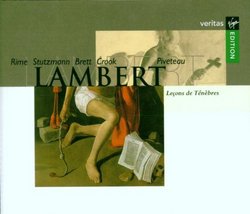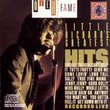| All Artists: Michel Lambert, Howard Crook, Philippe Foulon, Ivète Piveteau, Noemi Rime, Mauricio Buraglia, Nathalie Stutzmann, Charles Brett Title: Lambert - Leçons de Ténèbres / Brett, Crook, Rime & Stutzmann Members Wishing: 1 Total Copies: 0 Label: EMI/Angel/Virgin/Imports Release Date: 11/26/1996 Genres: Pop, Classical Styles: Vocal Pop, Opera & Classical Vocal, Historical Periods, Baroque (c.1600-1750) Number of Discs: 2 SwapaCD Credits: 2 UPC: 724356121324 |
Search - Michel Lambert, Howard Crook, Philippe Foulon :: Lambert - Leçons de Ténèbres / Brett, Crook, Rime & Stutzmann
 | Michel Lambert, Howard Crook, Philippe Foulon Lambert - Leçons de Ténèbres / Brett, Crook, Rime & Stutzmann Genres: Pop, Classical
|
Larger Image |
CD DetailsSimilarly Requested CDs
|
CD ReviewsPuristic Recording for Specialists Leslie Richford | Selsingen, Lower Saxony | 12/17/2004 (4 out of 5 stars) "?Leçons de Ténèbres? are a special genre within the French baroque. During the Middle Ages it had become a custom for selected passages from the biblical book of Lamentations to be chanted at early-morning vespers during Holy Week. In the course of time, these readings began to be held on the evening before by candle-light, the candles being slowly extinguished as the lessons proceeded. By the second half of the seventeenth century it had also become a custom to have these readings, now specially composed on Gregorian themes by the leading composers of the day, sung by opera singers instead of monks and nuns; according to eye-witness reports that have survived, these singers used to sit behind a curtain which they would occasionally open in order to wave to their enthusiastic supporters in the congregation. No wonder that some of the more pious clergy were not edified! If you are new to this rather specialised genre, I would suggest that you sample the recordings of Marc-Antoine Charpentier?s Leçons de Ténèbres produced by Gérard Lesne and his Il Seminario Musicale on Virgin. These are unforgettable performances that have been exquisitely planned and recorded and are never in the slightest monotonous. In second place, it would probably be advantageous to turn to the Leçons by François Couperin, available in several excellent editions. Ivète Piveteau?s 1988 recording of these Easter works by Michel Lambert (1610 ? 1696) are really directed at specialists and lovers of this baroque period. Lambert is famous for his courtly Airs, of which he composed almost three hundred, but he also left us two cycles of Leçons. Piveteau gives us here three readings for Wednesday, Thursday and Friday of Holy Week in a fairly puristic recording. That means almost 140 minutes of solo chant, accompanied by a single viola da gamba, a theorbo and, alternatingly, by a harpsichord or an organ. The soloists are Charles Brett, countertenor, Nathalie Stutzmann, deep alto, Noémi Rime, mezzo-soprano, and Howard Crook, tenor. Brett, Rime and Crook are early music specialists and do an excellent job with this difficult, meditative music with its complicated system of decorations. Ms Stutzmann, although having a wonderfully deep alto voice, does not convince me here: she uses too much vibrato, making her lessons too dramatic, too much like opera recitatives (and the Hebrew letters are turned into mini-arias). The recording is present and clear, but there is a considerable amount of background tape noise which does occasionally interfere with the musical enjoyment. On the whole, it is probably wiser to listen to these two discs in several sittings and to take the time to study the texts, which are interesting not only from the point of view of musical realisation but also from a theological standpoint. " Disappointingly dull scott | Calgary, Canada | 05/21/2008 (2 out of 5 stars) "The other reviewer has done a fine job of giving the background of this work, so I will just concern myself with the performance. I saw this recording many years ago (on the Veritas Edition series) and didn't buy it. It was then quickly deleted from the catalogue, and I always regretted not having it, because I really like French Baroque music. Finally I saw it re-released last year, and picked it up quite gladly. Then when I finally gave it a listen -- oh dear.
Firstly, I find the music itself to be quite dull. It is just solo voice and continuo, and never seems to break out from recitative. It hardly ever manages to move into something very melodic at all. I know lecons de tenebres are sombre and restrained, but these border on just boring. The examples by Charpentier are small scale, but the music is just so much more engaging. Secondly, I find the singers to be average at best, annoying at worst. The best of the bunch is Howard Crook who I usually really like, but here is just doing what he can with a dull score. Charles Brett sounds the worst I've heard him, more hooty and wobbly than ever. Natalie Stutzman employs a constant vibrato that irritates to the point of distraction. Noemi Rime is not at her best either. Having waited so long to hear this, when I finally did, I was quite disappointed. If you are looking for similar repertoire, you are far better to try the Charpentier (with Il Seminario Musicale), Couperin (with Hogwood), or Delalande (with Desrochers)." |

 Track Listings (24) - Disc #1
Track Listings (24) - Disc #1


